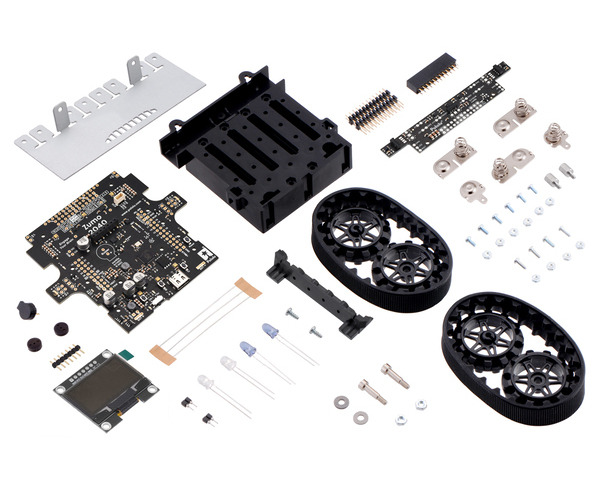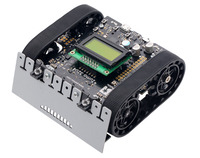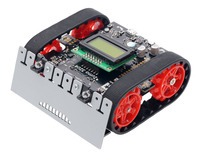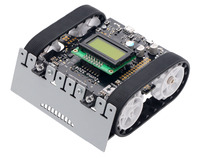Robot Kits » Zumo Robots and Accessories » Zumo 2040 Robot »
Zumo 2040 Robot Kit (No Motors)
The Pololu Zumo 2040 robot is a versatile tracked robot based on the Raspberry Pi RP2040 MCU, and this kit contains most of the parts you need to build one—all you need to add are a pair of micro metal gearmotors, four AA batteries, and a USB-C cable. It includes integrated dual motor drivers, quadrature encoders, line sensors, side and front proximity sensors, a full IMU, six RGB LEDS, and a graphical OLED display. The assembled robot is less than 10 cm × 10 cm—small enough to qualify for Mini Sumo. This product is a kit; assembly (including soldering) is required.
Alternatives available with variations in these parameter(s): version Select variant…
 Compare all products in Zumo 2040 Robot or
Compare all products in Zumo 2040 Robot or  Robot Kits with Soldering.
Robot Kits with Soldering.
| Description | Specs (10) | Pictures (18) | Resources (8) | FAQs (0) | On the blog (1) | Distributors (1) |
|---|
Overview
The Zumo 2040 is a highly integrated, user-programmable and customizable tracked robot. It measures less than 10 cm on each side and weighs approximately 275 g with batteries (160 g without), so it is both small enough and light enough to qualify for Mini-Sumo competitions, but its versatility makes it capable of much more than just robot sumo battles.
At the heart of the Zumo 2040 is a Raspberry Pi RP2040 microcontroller (like the one on the Raspberry Pi Pico), a 32-bit dual-core Arm Cortex-M0+ processor running at 125 MHz, which can be programmed with C, C++, Arduino, or Python. The Zumo 2040 has 16 MB (128 Mbit) of flash memory that ships preloaded with a MicroPython interpreter, so you can get started right away by plugging into its USB-C port and editing the included example Python programs. For advanced users who want to customize or enhance their robots with additional peripherals, the robot’s power rails and microcontroller’s I/O lines can be accessed via 0.1″-spaced through-holes along the sides and front of the main board. A 4-pin JST SH-compatible connector that works with our 4-pin JST SH-style cables provides access to the RP2040’s I2C0 bus and can be used with many SparkFun Qwiic and Adafruit STEMMA QT devices.
|
|
|
The Zumo 2040 features two H-bridge motor drivers and a variety of integrated sensors, including a pair of quadrature encoders for closed-loop motor control, a complete inertial measurement unit (3-axis accelerometer, gyro, and magnetometer), five downward-facing reflectance sensors for line-following or edge-detection, and front- and side-facing proximity sensors for obstacle detection and ranging. Three on-board pushbuttons offer a convenient interface for user input, and a 128×64 graphical OLED display, buzzer, and six RGB LEDs allow the robot to provide feedback.
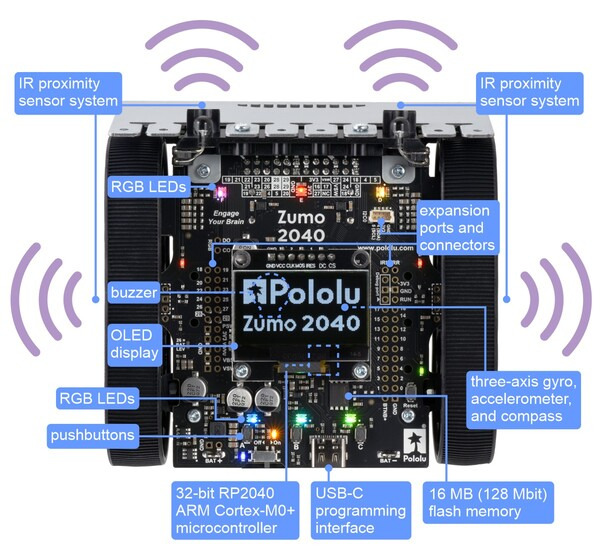 |
Zumo 2040 Robot features, top view. |
|---|
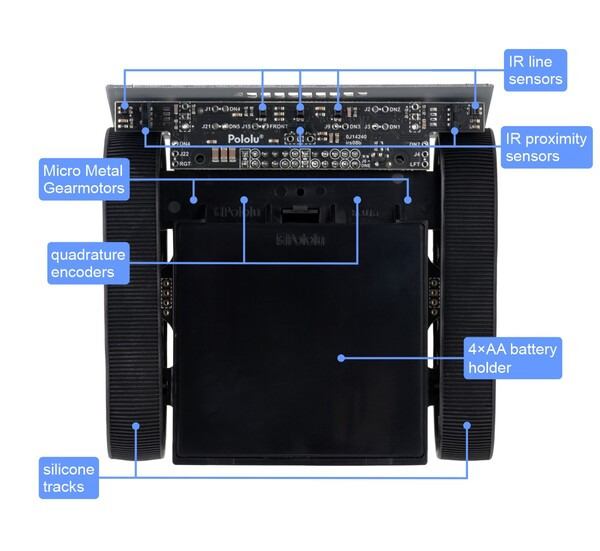 |
Zumo 2040 Robot features, bottom view. |
|---|
The Zumo 2040 robot is available fully assembled with three different motor options (see the Motors section below for more information on how these different gear ratios perform):
- Assembled with 50:1 HP motors — highest speed and lowest torque of the three options
- Assembled with 75:1 HP motors — average speed and torque
- Assembled with 100:1 HP motors — highest torque and lowest speed
The Zumo 2040 robot is also available as a kit (without motors) for those who would prefer to assemble it themselves or who want to use different motors than those in the three assembled versions.
Details for item #5010
This version of the Zumo 2040 robot (item #5010) is a kit; assembly (including soldering) is required. Motors and batteries are sold separately. A USB-C cable (not included) is required for programming.
Kit contents
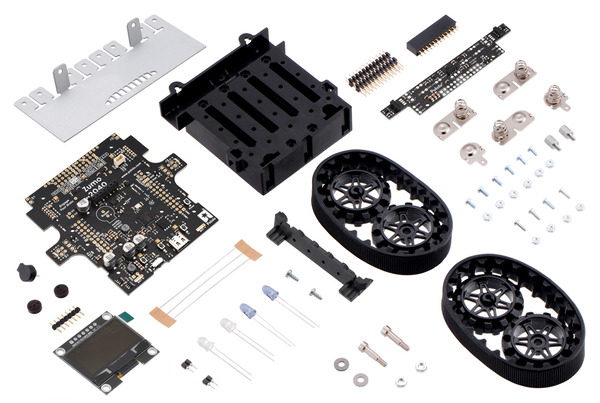 |
Contents of the Zumo 2040 robot kit. |
|---|
With the exception of motors, batteries, and a USB-C cable, this kit contains everything necessary to build and operate a Zumo 2040 robot:
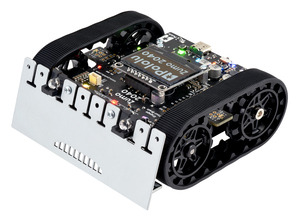 |
Assembled Zumo 2040 robot. |
|---|
- Zumo Chassis Kit
- Zumo 2040 Main Board (this includes two magnetic encoder discs that work with encoder sensors integrated into the main board and a through-hole buzzer)
- Zumo 2040 Front Sensor Array
- stainless steel Zumo Windowed Blade and plastic IR LED holder
- graphical OLED display
See the Zumo 2040 robot user’s guide for detailed assembly instructions.
Motors (not included with item #5010)
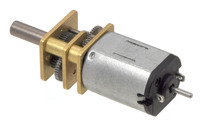 |
Micro Metal Gearmotor with Extended Motor Shaft. |
|---|
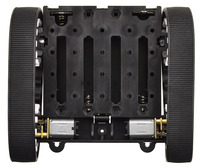 |
The Zumo chassis uses two micro metal gearmotors, one for each tread. The ideal motors for your robot depend on your desired torque, speed, and current draw, so motors are not included with the kit version of the chassis (motors are included with the assembled versions of the Zumo 2040 robot). We generally recommend using high-power (HP or HPCB, which have long-life carbon brushes) versions of our micro metal gearmotors since the tracks require a decent amount of torque to move effectively; higher gear ratios of the non-HP motors might work if you want lower current draw, but they will be slower and offer less control. Specifically, we primarily recommend the 50:1, 75:1, or 100:1 HP (or HPCB) motors for use with this chassis, and these are the versions we include in our assembled Zumo 2040 robot. Additionally, be sure to get a version with extended motor shafts if you want to be able to use the Zumo 2040 robot’s encoders.
You can use the following table to compare these three gear ratios in more detail. The first four columns are specifications of the motors themselves, while the last column is the measured top speed of a Zumo chassis loaded to a weight of 500 g (i.e. the maximum allowed for Mini Sumo) and driven with these motors. Note that the specifications are for 6V operation, which is approximately the voltage you would get with four alkaline batteries; four NiMH AA cells will typically provide less than 5V.
| Micro Metal Gearmotor |
Free-Run Speed @ 6V |
Stall Torque @ 6V |
Stall Current @ 6V |
Top Zumo Speed @ 6V and 500g |
|
|---|---|---|---|---|---|
| 50:1 HP or 50:1 HPCB | 625 RPM | 15 oz·in | 1600 mA | 40 in/s | (100 cm/s) |
| 75:1 HP or 75:1 HPCB | 400 RPM | 22 oz·in | 1600 mA | 25 in/s | (65 cm/s) |
| 100:1 HP or 100:1 HPCB | 320 RPM | 30 oz·in | 1600 mA | 20 in/s | (50 cm/s) |
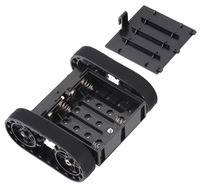 |
Batteries (not included)
The Zumo robot runs off of four AA batteries. It works with both alkaline and NiMH batteries, though we recommend using rechargeable AA NiMH cells.
Optional accessories
- Even more sensors
- Connectors (headers, jumper wires, etc) for adding those sensors or other peripherals
- Tools (diagonal cutters, pliers, screwdrivers, etc) to help with kit assembly
- Replacement sprockets in red or white. The Zumo 2040 robot includes black sprockets, but other colors can be purchased separately if you want to add a bit of personalization to your robot. (The pictures below show how these sprockets look on the similar Zumo 32U4 robot.)
|
|
|
